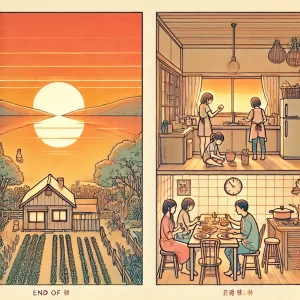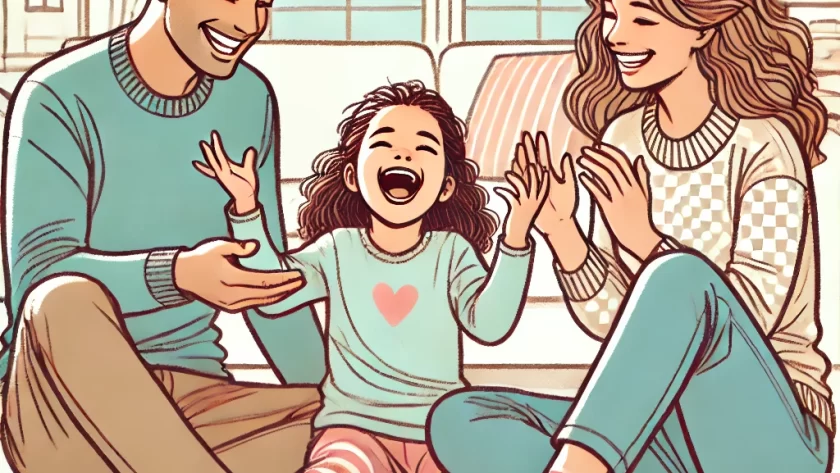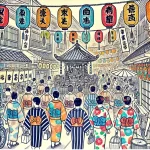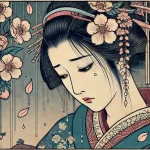Comedy – Gen Hoshino | 2022
喜劇 [Kigeki]
星野源 [HOSHINO Gen]
Words & Music : 星野源 [HOSHINO Gen]
This time, I’m continuing with another song by Gen Hoshino.
“Comedy” was released as a digital-only single in 2022 and was written as the ending theme for the first season of the anime “Spy×Family wiki.”
Spy×Family is a home comedy about a spy, an assassin, and a telepathic girl, all of whom were strangers, who build a “temporary family” and struggle daily to maintain an “ordinary family life.” It seems that the request to create an ending theme focused on the theme of “Family” led to the creation of this song.
- 喜劇(きげき) [kigeki] : comedy
- 喜ぶ(よろこぶ) [yorokobu] : rejoice
- 劇(げき) [geki] : drama
The original title is “喜劇 / kigeki”. It’s a word used specifically for theatrical plays within the broader concept of comedy. The reason for this title is likely because the main character, the spy, is constantly “acting” as someone else in his daily life.

Hoshino’s lyrics often contain fragmented or disjointed sentences, so it’s better for Japanese learners to enjoy the song by focusing on individual phrases rather than trying to translate the entire text.
争い合って 壊れかかった
arasoi atte koware kakatta
このお茶目な星で
kono ochame na hoshi de
生まれ落ちた日から よそ者
umareochita hi kara yoso mono
涙枯れ果てた
namida karehateta
帰りゆく場所は夢の中
kaeri yuku basho wa yume no naka
- 争う(あらそう) [arasou] : fight
- 壊れる(こわれる) [kowareru] : break
- かかる [kakaru] : take
- この [kono] : this
- お茶目(おちゃめ) [ochame] : playful
- 星(ほし) [hoshi] : star
- 生まれる(うまれる) [umareru] : be born
- 落ちる(おちる) [ochiru] : fall
- 日(ひ) [hi] : day
- よそ者(よそもの) [yosomono] : outsider
- 涙(なみだ) [namida] : tears
- 枯れ果てる(かれはてる) [karehateru] : dry up
- 帰る(かえる) [kaeru] : return
- 場所(ばしょ) [basho] : place
- 夢(ゆめ) [yume] : dream
- 中(なか) [naka] : inside
(translation) “Fighting each other, nearly broken
On this playful planet
Ever since the day I was born, I’ve been an outsider
My tears have dried up
The place I return to is within my dreams.”
It’s quite common to refer to Earth as “この星 / kono hoshi”(=this planet).
Incidentally, the word “星 / hoshi” is also used in 星野源 [Hoshino Gen]’s name.
零れ落ちた 先で出会った
koboreochita saki de deatta
ただ秘密を抱え
tada himitsu o kakae
普通のふりをした あなたと
futsū no furi o shita anata to
探し諦めた
sagashi akirameta
私の居場所は作るものだった
watashi no ibasho wa tsukuru mono datta
- こぼれる [koboreru] : spill
- 出会う(であう) [deau] : meet
- ただ [tada] : just
- 秘密(ひみつ) [himitsu] : secret
- 抱える(かかえる) [kakaeru] : hold
- 普通(ふつう) [futsū] : normal
- ふり [furi] : pretense
- する [suru] : do
- あなた [anata] : you
- 探す(さがす) [sagasu] : search
- 諦める(あきらめる) [akirameru] : give up
- 私 [watashi] : I
- 居場所(いばしょ) [ibasho] : place to belong
- 作る(つくる) [tsukuru] : create
- もの [mono] : thing
(translation) “I met you just ahead, where I spill
Carrying only secrets
Pretending to be normal
I gave up searching
I realized that my place to belong was something I had to create.”
“…のフリをする / …no furi o suru” means “pretend to be…”

あの日交わした
ano hi kawashita
血に勝るもの
chi ni masaru mono
心たちの契約を
kokoro tachi no keiyaku o
- あの日(あのひ) [ano hi] : that day
- 交わす(かわす) [kawasu] : exchange
- 血(ち) [chi] : blood
- 勝る(まさる) [masaru] : surpass
- もの [mono] : thing
- 心(こころ) [kokoro] : heart
- たち [tachi] : pluralizer for people
- 契約(けいやく) [keiyaku] : contract
(translation) “The contract of our hearts
Something that surpasses blood
Which we exchanged that day.”
In the story, there’s a fake family with no blood relation, and this is reflected in the lyrics as a contract made between them.
Now that I think about it, this theme is quite similar to “Koi,” isn’t it?
手を繋ぎ帰ろうか
te o tsunagi kaerō ka
今日は何食べようか
kyō wa nani tabeyō ka
「こんなことがあった」って
“konna koto ga atta” tte
君と話したかったんだ
kimi to hanashitakatta n da
- 手(て) [te] : hand
- 繋ぐ(つなぐ) [tsunagu] : hold
- 帰る(かえる) [kaeru] : return
- 今日(きょう) [kyō] : today
- 何(なに) [nani] : what
- 食べる(たべる) [taberu] : eat
- こんな [konna] : such
- こと [koto] : thing
- ある [aru] : exist
- 君(きみ) [kimi] : you
- 話す(はなす) [hanasu] : talk
(translation) “Shall we hold hands and go home?
What shall we eat today?
I wanted to talk to you about ‘something that happened.'”
These are very common phrases.
いつの日も
itsu no hi mo
君となら喜劇よ
kimi to nara kigeki yo
踊る軋むベッドで
odoru kishimu beddo de
笑い転げたままで
warai korogeta mama de
ふざけた生活はつづくさ
fuzaketa seikatsu wa tsudzuku sa
- いつの日も(いつのひも) [itsu no hi mo] : always
- 踊る(おどる) [odoru] : dance
- きしむ [kishimu] : creak
- ベッド [beddo] : bed
- 笑い転げる(わらいころげる) [warai korogeru] : roll over with laughter
- まま [mama] : as it is
- ふざける [fuzakeru] : joke around
- 生活(せいかつ) [seikatsu] : life
- つづく(つづく) [tsudzuku] : continue
(translation) “Every day
With you, it’s a comedy
Dancing on a creaking bed
Rolling with laughter
Our foolish life continues.”

As mentioned earlier, the spy is constantly acting in his daily life, so everything becomes like a play. However, with “you”, it becomes a comedy.
“ふざけた / fuzaketa” here means “crazy” or “foolish.”
劣ってると 言われ育った
otorotteru to iware sodatta
このいかれた星で
kono ikareta hoshi de
普通のふりをして 気づいた
futsū no furi o shite kizuita
誰が決めつけた
dare ga kimetsuketa
私の光はただ此処にあった
watashi no hikari wa tada koko ni atta
- 劣る(おとる) [otoru] : be inferior
- 言う(いう) [iu] : say
- 育つ(そだつ) [sodatsu] : grow up
- イカれている [ikarete iru] : be crazy
- 気づく(きづく) [kizuku] : notice
- 誰(だれ) [dare] : who
- 決めつける(きめつける) [kimetsukeru] : assume
- 私(わたし) [watashi] : I
- 光(ひかり) [hikari] : light
- ここ [koko] : here
- ある [aru] : exist
(translation) “I was raised being told I was inferior
On this crazy planet
Pretending to be normal, I realized
Who decided this?
My light was just here all along.”
“イカれている / ikarete iru” is slang for “crazy.”
あの日ほどけた
ano hi hodoketa
淡い呪いに
awai noroi ni
心からのさよならを
kokoro kara no sayonara o
- ほどける [hodokeru] : unravel
- 淡い(あわい) [awai] : faint
- 呪い(のろい) [noroi] : curse
- 心から(こころから) [kokoro kara] : from the heart
- さようなら [sayōnara] : goodbye
(translation) “On that day, the faint curse unraveled
And I said a heartfelt goodbye.”
顔上げて帰ろうか
kao agete kaerō ka
咲き誇る花々
sakihokoru hanabana
「こんな綺麗なんだ」って
“konna kirei nanda” tte
君と話したかったんだ
kimi to hanashitakatta n da
- 顔(かお) [kao] : face
- 上げる(あげる) [ageru] : raise
- 咲く(さく) [saku] : bloom
- 花々(はなばな) [hanabana] : flowers
- 綺麗(きれい) [kirei] : beautiful
- 話す(はなす) [hanasu] : talk
(translation) “Shall we raise our heads and go home?
The flowers are in full bloom
I wanted to talk to you
About how beautiful they are.”
“顔を上げる / kao o ageru” is the opposite of looking down in dejection.
どんな日も
donna hi mo
君といる奇跡を
kimi to iru kiseki o
命繫ぐキッチンで
inochi tsunagu kitchin de
伝えきれないままで
tsutaekirenai mama de
ふざけた生活はつづく
fuzaketa seikatsu wa tsudzuku
- どんな…も [donna … mo] : any
- 奇跡(きせき) [kiseki] : miracle
- 命(いのち) [inochi] : life
- つなぐ [tsunagu] : connect
- キッチン [kitchin] : kitchen
- 伝える(つたえる) [tsutaeru] : convey
(translation) “Every day
I’m living the miracle of being with you
In the kitchen that connects our lives
Without fully conveying it
Our foolish life continues.”
仕事明けに
shigoto ake ni
歩む共に
ayumu tomo ni
朝陽が登るわ ああ
asahi ga noboru wa aa
ありがとうでは
arigatō de wa
足りないから
tarinai kara
手を繋ぎ
te o tsunagi
- 仕事(しごと) [shigoto] : work
- 明け(あけ) [ake] : end
- 歩む(あゆむ) [ayumu] : walk
- 朝日(あさひ) [asahi] : sunrise
- のぼる [noboru] : rise
- ありがとう [arigatō] : thank you
- 足りる(たりる) [tariru] : be enough
(translation) “At the end of a workday
We walk together
As the sunrise comes up, ah
A simple thank you isn’t enough
So let’s hold hands.”
さあうちに帰ろうか
sā uchi ni kaerō ka
今日は何食べようか
kyō wa nani tabeyō ka
「こんなことがあった」って
“konna koto ga atta” tte
君と話したかったんだ
kimi to hanashitakatta n da
いつの日も
itsu no hi mo
君となら喜劇よ
kimi to nara kigeki yo
踊る軋むベッドで
odoru kishimu beddo de
笑い転げたままで
warai korogeta mama de
(translation) “Shall we go home now?
What shall we eat today?
I wanted to talk to you about ‘something that happened.’
Every day
With you, it’s a comedy
Dancing on a creaking bed
Rolling with laughter.”
永遠を探そうか
eien o sagasō ka
できるだけ暮らそうか
dekiru dake kurasō ka
どんなことがあったって
donna koto ga atta tte
君と話したかったんだ
kimi to hanashitakatta n da
- 永遠(えいえん) [eien] : eternity
- 探す(さがす) [sagasu] : search
- できるだけ [dekiru dake] : as much as possible
- 暮らす(くらす) [kurasu] : live
- どんな [donna] : what kind of
- こと [koto] : thing
- ある [aru] : exist
- 話す(はなす) [hanasu] : talk
(translation) “Shall we search for eternity?
Shall we live as long as we can?
No matter what happens
I wanted to talk to you.”
いつまでも
itsumademo
君となら喜劇よ
kimi to nara kigeki yo
分かち合えた日々に
wakachiaeta hibi ni
笑い転げた先に
warai korogeta saki ni
ふざけた生活はつづくさ
fuzaketa seikatsu wa tsudzuku sa
- いつまでも [itsumademo] : forever
- 分かち合う(わかちあう) [wakachiau] : share
- 日々(ひび) [hibi] : days
(translation) “Forever
With you, it’s a comedy
In the days we shared
Beyond the laughter
Our foolish life continues.”
Coincidentally, just like “Koi,” this song also has the theme of a fake marriage, but “Comedy” might have a slightly more negative vibe.
Lastly, let’s look at three similar but slightly different words used in these two songs.
- 暮れる(くれる) [kureru] : get dark
- 暮らす(くらす) [kurasu] : live
- 暮らし(くらし) [kurashi] : life
The term “暮れる / kureru” means “get dark.” “暮らす / kurasu” literally translates to “let it get dark,” implying the act of living as the day ends. Thus, “暮らし / kurashi” refers to the life we lead.

If you remember these three words today, as well as the phrases for saying “sayōnara” and “arigatō”, that’s enough.
Additionally, Gen Hoshino also composed the theme song “光の跡 / hikari no ato” (English title: “Why”) for the movie “Spy×Family Code: White”, released in December 2023.
Tomorrow, I’ll continue with more music related to Spy×Family.
Thanks for reading! Feel free to comment if you have any feedback or questions.
Follow me on X.



